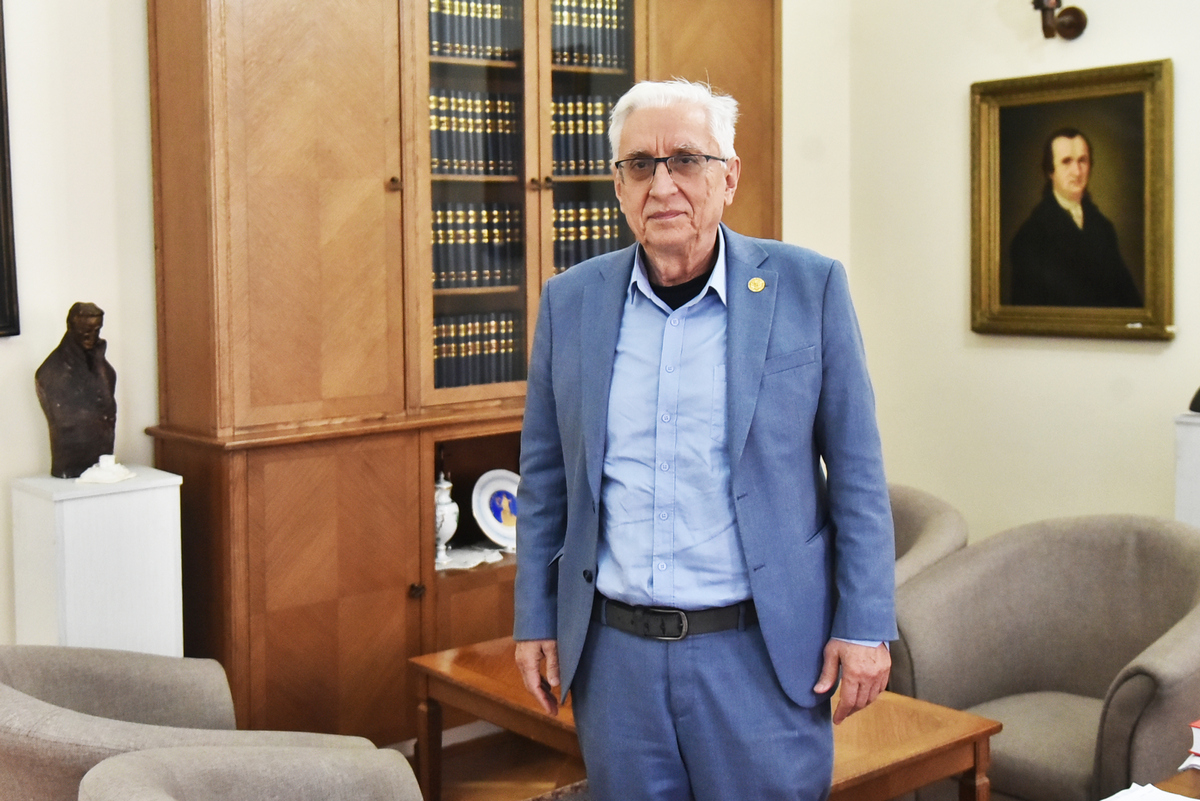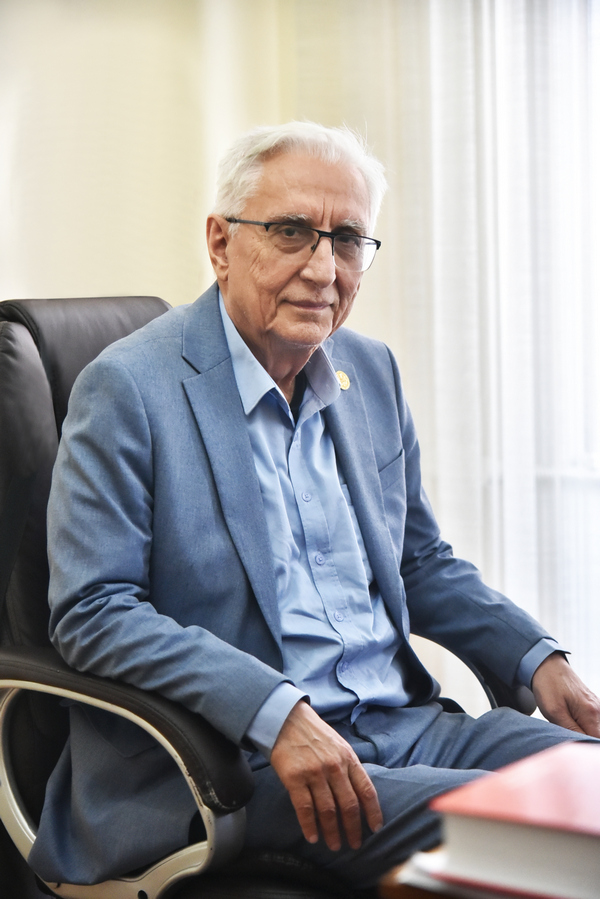The Science Fund’s priorities are devising scientific policy following global trends in the development of science
We spoke with the President of the Scientific Council of the Science Fund of the Republic of Serbia and the representative of the Serbian Academy of Sciences and Arts (SANU) in the Council, Professor Stevan Pilipović, about the importance of the Fund’s establishment and how Serbian science fares to the rest of the world.

You are the President of the Scientific Council and also the SANU representative in this body. As an academic, what do you think, how has the scientific community in Serbia benefitted from the Science Fund?
The formation of the Science Fund in 2019, which was established by the law passed by the Serbian government, is one of the most significant steps towards organizing science in Serbia to correspond to the EU level. It is precisely under the auspices of the Science Fund that the generally accepted idea of harmonizing scientific standards in our science with the top-quality scientific standards in the European Union is most clearly represented. Science in Serbia, especially theoretical science, was relatively modestly supported by the state for a long period. Theoretical sciences are less dependent on financial investments, as our science is still highly valued. The importance of a well-founded science evaluation system in the 1990s was diminished at the beginning of the new millennium by negative tendencies such as adding unrelated names to scientific works, appearance in journals with reviews that depended on how much money was donated to the publication and publishing works in the so-called predatory magazines. A decrease in quality to the quantity of published works was noticeable. All this contributed to the degradation of value criteria, especially in the insufficiently adjusted system of advancement in scientific and teaching positions.
In the second decade of the 21st century, it became very clear what was wrong, but apart from general and often unarticulated dissatisfaction, there were no significant ideas on how to improve the scientific activities system in Serbia. In such circumstances, the establishment of the Science Fund was an extremely important solution.
In line with the relevant regulation, the Science Fund introduces Serbian science into European scientific flows by fully adapting it to the EU’s evaluation system. Thus, the Fund directs science towards contemporary trends and finding solutions to the real problems of our society, and thus towards application with a clear scientific basis. The Science Fund pays special attention to demarcation from professional innovations and favours a direction towards applied science, or the application of science. The establishment of the Science Fund ensures that experienced scientists, as well as new generations of scientists, lead Serbian science. With a passing rate of projects of about 15% on Science Fund’s Public Calls, scientists understand and accept the conditions of fair competition and the struggle for new ideas and new solutions, which are measured according to the highest scientific standards in the European Union. That, in a nutshell, is the importance of the establishment of the Science Fund.
What are the Science Fund’s priorities in terms of programmes and funding?
The Science Fund’s priorities, that is the priorities of the Scientific Council, are devising scientific policy following global trends in the development of science. The Science Fund’s programmes implemented through competitive public calls should be in correlation with the state’s financial capacities and the scientific capacities of our scientific community, as well as especially be directed towards problems that are found on a universal, global level, to direct science towards solving problems that are particularly important for our country. Here, I am primarily referring to identity sciences, then sciences directed towards information technologies, healthcare and food, but also theoretical sciences which have a special importance in the educational system and are a prerequisite for the acceptance of new scientific knowledge which is based on highly sophisticated theoretical foundations.
Science Fund’s biggest success is the significant transformation of science in Serbia
Another important aspect is the appropriate development of science in the regions, as well as the relationship between science implemented by scientists working at universities and at institutes. These are not simple issues and they certainly deserve special attention and to be treated as priorities in the development of the Science Fund’s activities.
Immediately after the Science Fund was formed, did you believe that reforming science in this way would be possible, i.e. that the scientific community would accept a competitive way of financing?
In the beginning, we did not have a very clear idea to what extent the state (as it is always under pressure to invest in projects that are considered more important for the country) and the scientists would accept the new way of applying for funding for scientific projects. We started with Program for Excellent Projects of Young Researchers – PROMIS. It was a great solution because the scientists, who are at the early stage of their careers, accepted the conditions imposed by the public call with great enthusiasm, completely unencumbered. However, things were much more complicated with the Public Call for the Program IDEAS. Experienced, top-quality scientists worked as principal investigators, but with acquired habits that did not correlate with the formal requirements contained in the Fund’s public call.
What was very important was the fact that the projects were evaluated by experienced foreign scientists and that none of the scientists in Serbia participated in the evaluation of any project. By using certain keywords, the projects were assigned to reviewers who were hired based on very clear criteria and who had no connection with the projects they reviewed. This is where the Science Fund showed great skill. At this point, after five years, the Science Fund has demonstrated exceptional maturity in performing the most delicate activities in the process of evaluating scientific projects.
You have abundant experience as an evaluator of international projects under the auspices of the European Commission programme. How important is it for the Science Fund that the project selection is harmonized with the European one?
Yes, I do have a long-standing experience. The selection procedures are largely harmonized with European ones. My experience tells me that we must improve the work of reviewers in the area of harmonization/consensus. In this regard, the problems in Serbia are the same as in other countries. There is a lot of competition between the various funds to provide the highest quality reviewer lists. I think that, at least for identity sciences, we could include our best experts, but the distrust that exists in our scientific community when it comes to domestic reviewers prevents us from doing anything in this regard.
Science Fund’s priorities are devising scientific policy following global trends in the development of science
Even without having appropriate experience, we advocate that investments in science should be carried out, relative to the investments in science in the European Union Member States. Given that the state budget projected insufficient funds for 2024, the Scientific Council raised the issue of additional funding in 2024.
What has been the Fund’s biggest success so far and what is the biggest challenge for the next period?
As I noted in my answer to your first question, the Science Fund’s biggest success is the significant transformation of science in Serbia in the direction of harmonization with European standards. As for the biggest challenges, I hinted at them in my previous question, i.e. an insufficient increase in the financial resources for science in 2024. As we don’t have enough funds to launch the Public Call fot the Program IDEAS 2024, in which scientists from all scientific fields could participate, Serbian science can slow the continuity of development achieved in previous years. That is why our engagement in finding sufficient funding for the program IDEAS 2024 is very important.
